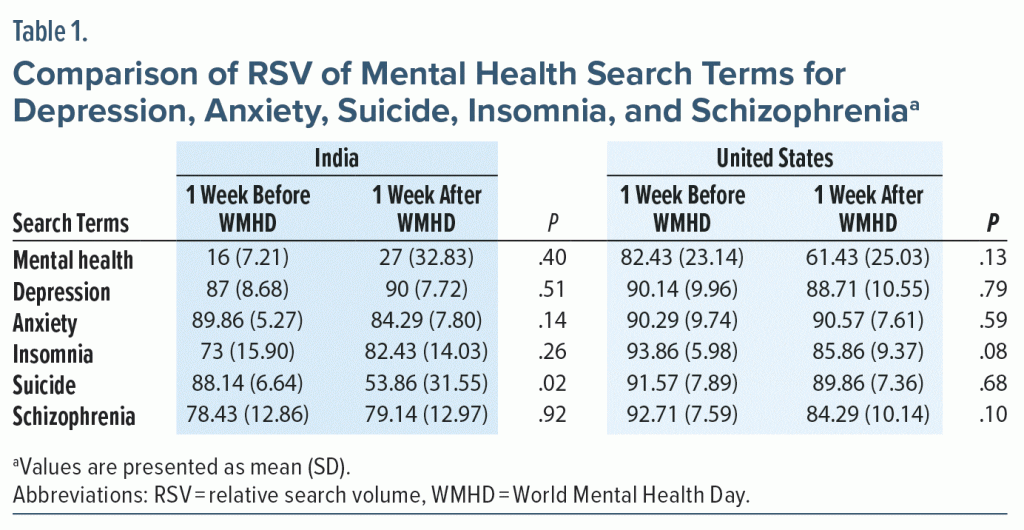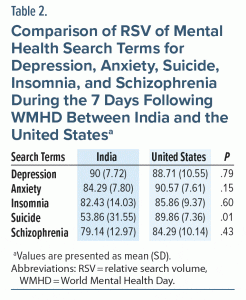World Mental Health Day (WMHD) is an important global public program celebrated annually on October 10 since 1992.1 When launching this program, the aim of the World Federation for Mental Health was to promote awareness to change perceptions regarding mental illness. To achieve this aim, the organization selects a theme for WMHD and distributes related public education materials with the help of various organizations worldwide. Most of the organizations working in the mental health sector also conduct various educational programs for the public on this day to raise awareness regarding mental health and to influence health behavior. A significant amount of manpower as well as financial, technological, and media resources are utilized each year to promote WMHD. However, few studies have explored the impact of WMHD on influencing public attitudes toward mental health.2 Systematically studying the real-time mental health–related information-seeking behavior using Google search trends following WMHD celebrations can provide important insights regarding its impact and reach.3
The primary objective of this study was to explore changes in the Google Trends relative search volume (RSV) of topics/terms associated with mental health in India. The RSV number indicates the proportion of popularity of a term relative to the peak popularity during the reference period for the selected region. An RSV of 100 indicates the peak popularity for a search term in Google during the specified time for a particular region. Any value < 100 indicates relative search popularity when compared to peak popularity for the search term.4 We also compared the study results with selected Google Trends data from the United States and the world.
We hypothesized that following WMHD programs, there could be more interest in the topic “mental health,” which will manifest as an increase in internet searches. Moreover, increased awareness about mental health conditions might influence the internet searches for important keywords indicative of mental distress: depression, anxiety, insomnia, and suicide.
METHODS
Google Trends (https://support.google.com/trends/) was searched for the keywords suicide, schizophrenia, depression, anxiety, and insomnia and the topic “mental health.” Data were accessed and downloaded from Google Trends on October 30, 2022. The location of the search comprised India and the United States for the mental health keywords and India, the United States, and the world for the search topic “mental health.” The time scale selected for each Google Trends query was 14 days, which consisted of 7 days leading up to WMHD 2022 and 7 days following WMHD 2022 (which included the WMHD date).
The difference in Google Trends RSV data was analyzed using t tests and 1-way analysis of variance in SPSS version 21 (SPSS Inc, Armonk, New York). Results were considered significant if the P value was < .05.
RESULTS
There was no significant increase in RSV for the search topic “mental health” during the 7 days following WMHD celebration in India (16 vs 27, P = .40), the United States (82.42 vs 61.43, P = .13), or worldwide (30.57 vs 41.71, P = .32) when compared to RSV during the 7 days leading up to WMHD. There was no significant difference in RSV during the 7 days following WMHD in India, the United States, or worldwide (P = .11).
A significant reduction in RSV was seen during the 7 days following WMHD celebration in India (88.14 vs 53.86, P = .02) for the search term suicide. There was no significant difference for other search terms between the 2 time periods in India or the United States. The findings are summarized in Table 1. There was a significant difference in RSV for the search term suicide between India and the United States during the 7 days following WMHD celebration (53.86 vs 89.86, P = .01). There was no significant difference for other search terms between India and the United States during the 7 days following WMHD celebration. The findings are summarized in Table 2.
DISCUSSION
This study failed to show any significant impact of WMHD celebrations on online mental health information–seeking behavior in India, the United States, or the world. Similarly, a study2 exploring the impact of global public health days on online health information–seeking behavior reported no significant increase in RSV for the search topic “mental health” for Chile, Brazil, or Colombia following WMHD. Another similar study4 from the Arabian Peninsula also reported no significant increase in RSV for Bahrain, Kuwait, Oman, or Qatar. The lack of increase in RSV for mental health search terms following WMHD may indicate its lack of impact to influence online mental health information seeking at the population level. However, it may also reflect changes in population behavior following WMHD celebrations wherein instead of searching the internet, people directly approached their health care providers for help after becoming more aware of mental health conditions. Another reason could be that people accessed mental health–related information from social media sites where materials to increase mental health awareness among the general public were frequently circulated by various organizations as a part of WMHD celebrations.
Studies2,5 also reported a significant increase in RSV for the search topic “mental health” for the United Arab Emirates, Saudi Arabia, Uruguay, and Nicaragua associated with WMHD celebrations, but such increase in public interest in online mental health information seeking was very short lived. There is a need to systematically study the factors associated with poor sustained interest in seeking mental health information online following WMHD.
This study also found a significant reduction in suicide searches in India following WMHD. It may indicate that suicidal ideation declined significantly among the Indian population following various programs associated with WMHD celebration such as awareness campaigns and education programs, suggesting the positive impact of WMHD on the Indian population.6 There is a need to further explore this important finding using better research methodologies to understand the correlation between lower online interest for the search term suicide and actual suicidal ideation or attempts in India.
CONCLUSION
This study failed to find a significant impact of WMHD on online mental health information–seeking behavior except for suicide. However, future well-conducted research is needed to understand the population behavior in mental health information seeking following WMHD in real-world settings and the implications of the reduction in RSV for suicide in predicting suicidal behavior at the population level.
Article Information
Published Online: August 8, 2023. https://doi.org/10.4088/PCC.22br03444
© 2023 Physicians Postgraduate Press, Inc.
Prim Care Companion CNS Disord 2023;25(4):22br03444
Submitted: November 2, 2022; accepted February 15, 2023.
To Cite: Uvais NA, Vaseel M, Jalal J, et al. The impact of World Mental Health Day on online mental health information–seeking behavior in India: a Google Trends study. Prim Care Companion CNS Disord. 2023;25(4):22br03444.
Author Affiliations: Department of Psychiatry, Iqraa International Hospital and Research Centre, Calicut, Kerala, India (Uvais); Rythm-Comprehensive Mental Health Programme: An initiative of IQRAA Hospital, India (Vaseel, Jalal, Krishna, Febina).
Corresponding Author: N. A. Uvais, MBBS, DPM, Iqraa International Hospital and Research Centre, Calicut, Kerala, India ([email protected]).
Relevant Financial Relationships: None.
Funding/Support: None.
References (6)

- World Mental Health Day. Ment Health Fam Med. 2010;7(2):123. PubMed
- Havelka EM, Mallen CD, Shepherd TA. Using Google Trends to assess the impact of global public health days on online health information seeking behavior in Central and South America. J Glob Health. 2020;10(1):010403. PubMed CrossRef
- Uvais NA, Rasmina V. Analysis of psychiatry-related search engine trends during the COVID-19 pandemic in India. Prim Care Companion CNS Disord. 2020;22(5):20com02756. PubMed CrossRef
- Venkatesh U, Gandhi PA. Prediction of COVID-19 outbreaks using google trends in India: a retrospective analysis. Healthc Inform Res. 2020;26(3):175–184. PubMed CrossRef
- Ajbar A, Shepherd TA, Robinson M, et al. Using Google Trends to assess the impact of global public health days on online health information-seeking behavior in Arabian Peninsula. J Egypt Public Health Assoc. 2021;96(1):4. PubMed CrossRef
- Ayers JW, Althouse BM, Leas EC, et al. Internet searches for suicide following the release of 13 Reasons Why. JAMA Intern Med. 2017;177(10):1527–1529. PubMed CrossRef
Enjoy this premium PDF as part of your membership benefits!







